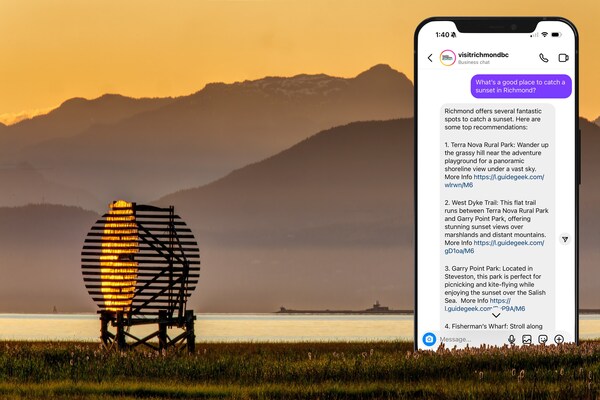- by foxnews
- 17 Mar 2025
Richmond, BC Unveils Game-Changing AI Travel Assistant to Transform Visitor Experience
Richmond, BC Launches AskLulu: A Game-Changing AI Travel Assistant
- by travelandtourworld
- 18 Sep 2024
- in travel

Richmond, BC Launches AskLulu: A Game-Changing AI Travel Assistant
Tourism Richmond has unveiled AskLulu, a pioneering AI travel assistant developed with GuideGeek technology from Matador Network. This new digital tool is set to transform the travel experience for visitors to Richmond, British Columbia, by offering real-time, personalized information and recommendations. This launch represents a significant advancement in how destinations utilize artificial intelligence to enhance traveler engagement.
AskLulu: The New AI Travel Companion
Travelers can use AskLulu to gather information about various aspects of their visit, including recommendations for Asian cuisine, historical sites, and unique local experiences like whale watching. This service aims to make the process of exploring Richmond as seamless as possible, providing instant access to a wealth of local knowledge.
Impact on Tourism and Visitor Engagement
The introduction of AskLulu reflects a growing trend in the travel industry towards integrating artificial intelligence to improve visitor engagement. The use of AI tools has surged by 40% over the past year, and Richmond is at the forefront of adopting such technology in Canada. The success of this initiative underscores the importance of leveraging innovative solutions to enhance the travel experience.
By offering an AI-driven assistant, Tourism Richmond is positioning itself as a leader in digital visitor services. This approach not only helps travelers navigate the city more effectively but also allows the destination to showcase its unique offerings in a more interactive and accessible manner. The deployment of such technology is expected to set a new standard for how destinations engage with potential visitors, potentially influencing other destinations to follow suit.
Technological Integration in Tourism
The success of AskLulu demonstrates the potential for AI to revolutionize how destinations interact with travelers. By providing real-time, accurate information and personalized recommendations, AI tools can significantly enhance the visitor experience, making travel planning more efficient and enjoyable. This shift towards digital solutions reflects a broader movement within the travel industry to embrace technology as a means of improving customer service and engagement.
Tourism Richmond and Matador Network
Matador Network, known for its influential media presence and innovative travel solutions, has developed GuideGeek as a tool to support modern adventurers. With a significant following and extensive content distribution, Matador Network is a key player in shaping the future of travel and tourism technology.
Final Thoughts
The introduction of AskLulu by Tourism Richmond marks a significant step in the integration of AI technology into travel services. By offering an AI-driven tool that provides real-time, personalized information, Richmond is setting a new benchmark for how destinations can engage with travelers. This move not only enhances the visitor experience but also highlights the growing role of technology in shaping the future of tourism.
- by foxnews
- descember 09, 2016
Rare artifacts representing America's 250th birthday will be featured in major exhibition
Rare artifacts will be featured in the "Give Me Liberty" exhibit at the Virginia Museum of History & Culture in Richmond to commemorate America's upcoming 250th anniversary.
read more




